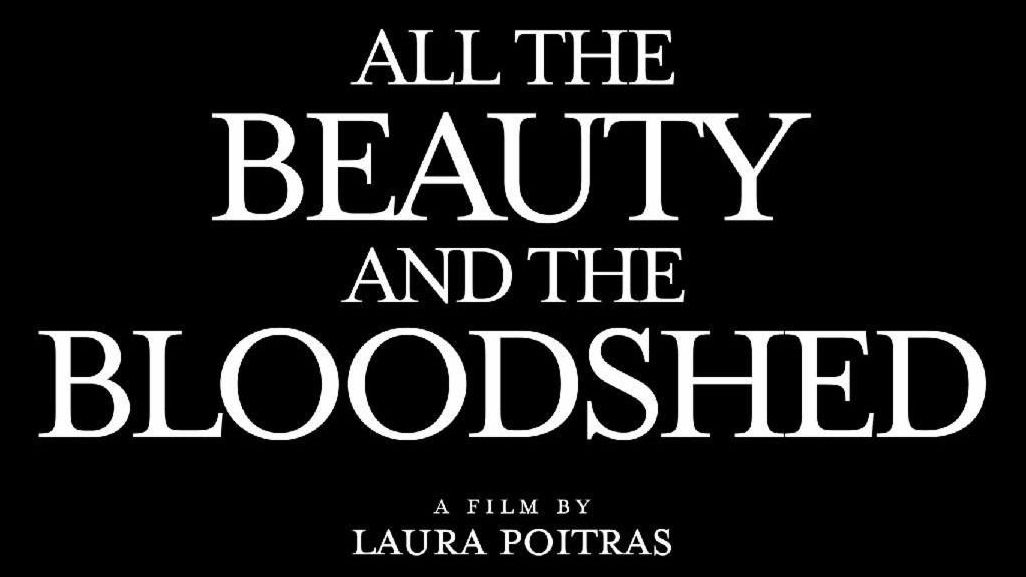By Glenn Dunks

There is a line early in All the Beauty and the Bloodshed where somebody describes the film’s subject, photographer and activist Nan Goldin, as somebody who “knew how to use her power.” I found it appropriate that the director of this movie is Laura Poitras, somebody to whom you could also say knows how to use their power. Poitras is, after all, the filmmaker who has been at the centre of multiple political stories—I mean, it’s rare for a documentarian to be a character in a dramatization of a major news story (she was portrayed by Melissa Leo in Oliver Stone’s Snowden). And to watch a Poitras film is often to be swept up in a swirl of chaos and pain.
Unlike Risk (about Julian Assange) or her Oscar-winning Citizenfour (about Edward Snowden), Poitras herself is not a part of the story here. Nevertheless, her latest is the thrilling and involving work of a filmmaker whose skills feel almost unparalleled. There’s a quiet, almost sneaking, grandeur to her work here as a filmmaker, directing the viewer down the many paths of Goldin’s story with grace, humility and intrigue, and with a technical finesse that is subtle yet entirely specific from one cut to the next.
All the Beauty and the Bloodshed became just the second non-fiction title to win the Golden Lion at the Venice Film Festival. I wasn’t a fan of the first—that would be Gianfranco Rosi’s Sacro GRA in 2013—but I’m not surprised. This is a film that lands in a real sweet spot of documentary. The artist biography is, after all, a staple of the form. But by fusing a career retrospective with memoir and contemporary fight for justice, Poitras has yet again found herself with her camera in the exact right place at the exact right time.
Until recently, the 69-year-old Nan Goldin was probably best known for her work as an artist in downtown New York City. Through the 1970s and ‘80s, across the post-punk new wave, no wave, post-disco and proto-club kid eras through to the AIDS-era encapsulated by the likes of her friend David Wojnarowicz, Goldin captured life in its messy, celebratory and heartbreakingly personal best. An openly bisexual woman, Goldin’s early work gave positive life to transgender and queer communities and she was the first, in the early ‘90s, to curate an exhibit of works from other LGBTQ artists (the fallout from which was detailed in another fantastic doc, Wojnarowicz: Fuck You Faggot Fucker two years ago).

But after battling addiction for many years in one form or another, Goldin’s recent notoriety has come as the founder of P.A.I.N.—or Prescription Addiction Intervention Now. Her goal was to rid the art world of its associations to the Sackler family, the mega-rich owners of Perdue Pharma (among others). The Sacklers has profited extraordinarily from the American opioid epidemic as the manufacturer of Oxycontin. As we see unfold here, Goldin and her P.A.I.N. colleagues seek to pressure the famous art institutions of the world including the Metropolitan Museum of Art, the Guggenheim and the Louvre to reject Sackler donations and remove their name from wings, courtyards, rooms and entire galleries.
Poitras captures protests with vigour, producing a swell of emotions as empty orange med bottles and fake prescriptions and dollar bills rain down. She uses her knowledge of and history with ACT UP as inspiration, holding die-ins and putting the deaths of half a million people squarely at the feet of a government who does nothing to regulate a greedy, destructive industry. (And as an aside, I’d like to say how great it is to see a documentary bring up AIDS and ACT UP without needing to yet again explain it for the normies, using that Tom Brokaw news footage for a thousandth bloody time).
But this is no one-sided narrative. Poitras shows just as much reverence to Goldin’s photography career, utilizing Goldin’s own curated slideshows without fussy tricks like pans, zooms and faux three-dimensional augmentation as too many movies feel the need to do. And furthermore, the diversions in Goldin’s family history are told with a loving, affectionate sincerity that never shields the viewer from the harsh realities of an era that messed up generations of people. From those early childhood moments of hearing her parents concoct a lie about her sister’s suicide, to the guttural anger of her protests in the hallowed halls of The Met, Goldin comes across as a survivor who’s done everything she could to highlight life in, yes, all of its beauty and its bloodshed.
Poitras’ film does Goldin justice, but just as rightly does Poitras herself justice. She makes every right choice I could have possibly wanted her to make, venturing into heretofore unseen emotional places as a result. This is immaculate, impeccable filmmaking that deserves to be seen.
Release: Opens this week in New York with presumably many more places around the country to follow.
Award chances: It would be extremely churlish of the doc branch of the Academy to not nominate this one given it has already won the Golden Lion and will surely be a popular choice among critic awards. Having said that, they move to the beat of their own drum. And as Chris Feil on the This Had Oscar Buzz podcast has noted several times, the doc branch are seemingly allergic as of late to nominating a filmmaker after they have won (several of the big snubs can potentially be explained this way). In fact, the last winner to receive a later nomination was Michael Moore when Sicko got a nomination in 2007, seven years after winning for Bowling for Columbine. Will Poitras break that streak? I want to say yes.